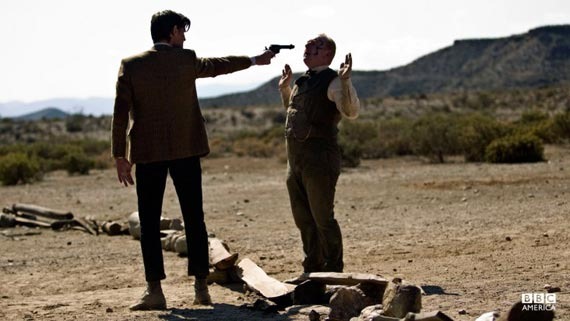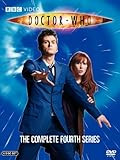This is what happens when the Doctor travels alone

‘A Town Called Mercy’ reminded us once again how fragile the Time Lord’s resolve really is. It begs the question: will the Doctor really be able to stay by his own rules once the Ponds leave for good? How much longer can he stand to show mercy to the wicked?
I didn’t have very much to say about “Dinosaurs on a Spaceship” last week except for minor things like the guest stars were fun and that I wondered how Nefertiti would be able to talk to the hunter after the Tardis left. All in all though, it was a strong episode and a good sign for the rest of the season. There was one other thing that struck me about the episode — the Doctor didn’t save Solomon. He had the chance to (the dirty old man even begged him to) but the Doctor chose to leave him to be killed in the explosion. I saw some comments after the episode that this seemed too apathetic for the Doctor’s character, but I had a feeling this was a very deliberate choice by the writers. That was confirmed in this week’s episode.
In “A Town Called Mercy,” the Doctor is forced by his own set of rules to protect a doctor who experimented on soldiers during a war on his planet at his military’s request. After confronting the alien, he becomes enraged and fervently pushes the guilty man towards his executioner. Like the last episode, the Doctor is getting tired of being merciful:
But they keep coming back, don’t you see? Every time I negotiate, I try to understand. Well not today. No, today I honor the victims first. His, The Master’s, the Daleks’. All the people that died because of my mercy!
It’s a powerful statement (one of the best moments from Matt Smith so far in his run on the show, in my opinion) and it harkens back to several other moments in earlier season of the show. Even as early as the Daleks’ introduction in the 2005 series, we see the Doctor full of rage towards his enemy, actively mocking the thing until Rose shows it some small kindness. 10 is so full of fire during Donna’s Christmas episode that we discover later he would have died if Donna hadn’t pulled him back to sanity. And don’t forget “The Waters of Mars” when he slips into as “the Time Lord Victorious.” It was only when Adelaide sacrificed herself to maintain the timeline that the Doctor once again remembered why he has to do the things he does and why the rules he has for himself are so important. And in “A Town Called Mercy” it takes the sheriff dying to protect the guilty alien for the Doctor to know he can’t waver from mercy.
Amy says it best: “This is what happens when you travel alone for too long.” The Doctor has been weaning himself off the Ponds either because he knows they need to find their own lives or because he knows that the pair will keep getting older and older and he can’t handle seeing that happen. Either way, the Doctor is spending more and more time alone and as we’ve seen, these times in between companions is when he starts to falter. I mean, he’s actually pointing a gun at someone … he’s actually holding a gun. He’s actually a second away from using the gun. That’s how far he’s gone being alone for so long. He needs his companions there to remind him who he is and what he needs to be lest he slips into the madness that comes with 1,200 plus years of life. And with Amy and Rory leaving (one way or another) soon, how will Jenna-Louise Coleman‘s companion fill that so very important role?
 CliqueClack
CliqueClack



Quoting…
“Even as early as the Daleks’ introduction in the 2005 series…”
You do know that The Doctor has a long, long history with the Daleks, going back to the first season of the first Doctor (William Hartnell).
Yes I am well aware of that, but I haven’t had a chance to watch many of the older episodes and I didn’t want to speak out of turn about the Doctor’s relationship with the Daleks.
Oh my. Too many writers regard Doctor Who as beginning with Eccleston in 2005, and ignore the legacy. If you’re going to write about The Doctor, you really need to look back a bit. All those past regenerations make him who (no pun intended) he is today. Or in the future… or in the past. You know, all that wibbly wobbly timey-wimey stuff.
The Doctor and the Daleks are literally joined at the hip.
At what point were they literally joined at the hip?
Seriously? Among other events the Doctor was there at the creation of the Daleks. The Daleks destroyed the TimeLords and Gallifrey. What I meant is that the history of the Daleks and The Doctor is intertwined to an incredible degree.
I was trying to be polite, but saying the Daleks were “introduced in 2005″ shows quite a lack of familiarity with the basic mythology, and some familiarization is in order.
I understand the history between the Doctor and the Daleks. I was cracking wise about the misuse of “literally”.
Pardon my misuse, O wise one.
My dear Katie,
I concur with Alex’s comments. You really must be very young and in that regard it’s wonderful that you’ve taken to the new Who with a passion. You can’t possibly truly understand the Doctor without a reasonably comprehensive knowledge of the Classic series. I’m blessed to be 3 months older than the creation date of Doctor Who, and whilst I missed the first two Doctors, it was with the 3rd and 4th that I grew up. An inexpensive paperback and good introduction is Mark Campbell’s “Doctor Who The Complete Guide”. It provides a synopsis and personal evaluation of each and every episode from Episode 1, Series 1, until the end of the 5th season of the new series (the 11th Doctor’s first year). With an excellent index, it allows you to easily select a “monster” and review its history. Whilst there are more comprehensive (and geeky) books, this is certainly a good start. Check it out and enjoy your Whovian journey into history! https://www.bookdepository.co.uk/Brief-Guide-Doctor-Who-Mark-Campbell/9781849015875
A great place to start with the Daleks is “Doctor Who: The Dalek Handbook”. A hardback, full of photos from day 1 and geeky tit bits, it’s a wonderful introduction to the Doctor’s greatest enemy. https://www.bookdepository.co.uk/Doctor-Who-Dalek-Handbook-Steve-Tribe/9781849902328